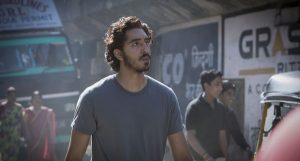
There are three kinds of stories centered on technology. The first is of the technophobe variety, in which the advanced technology of today is treated as an evil entity. Sometimes it’s AI becoming self-aware; other times it’s despicable humans utilizing the technology for their heinous actions. The second is a “deep” message on how technology alienates us from the world, tearing apart families and social circles. The third is of the uplifting order, in which the advanced technology brings people together. “Lion” fits into the third category.
Saroo (Dev Patel) uses Google to help locate the homestead in which he was separated from as a child. He utilizes the search engine to look up train speeds to counteract them with the amount of time and distance he traveled as a child away from home. The Google Earth function comes into play to track his every move, the street view aiding in recreating his memories of locales. It’s almost to the point of the film playing as a sizzle reel for Google. Its sincerity in bringing the incredible true story to the silver screen prevents it from feeling as such.

Besides, Google only plays a major factor in the third act. The first act transports the audience back to the late eighties in Kolkata, where Saroo (Sunny Pawar playing the younger version) is separated from his family. He and his brother, Guddu (Abhishek Bharate), traveled to the city for a night job. Guddu leaves his younger brother behind in search of information, with the sleepy youngster drifting off on the bench. He awakens hours later, his brother nowhere in sight. The stunted mindset of a terrified young boy causes him to board the train, traveling to an unknown destination over the course of a few days.
I commend director Garth Davis and screenwriter Luke Davies for spending so much time with the lost boy! Most would rush past this, only showing the child becoming stranded before cutting to him being “rescued” by his foster parents. That would severely undercut the hardship Saroo went through, eliminating the tension that gravitates the audience to the youngster’s situation. Yes, one would feel sorrow simply getting a glimpse of the ordeal, but the emotional heft that comes with witnessing it would’ve been sorely missing. Here, the audience spends a good chunk of the film in the slums of India, as ignorant to the surroundings as Saroo is. The camera jerks around violently whenever the kid’s anxiety reaches a fever pitch, such as when he is awoken in an alley by grown men abducting the homeless children around him. Are they pedophiles or serial killers preying on the weak or child services agents saving those in need? We are never sure, as this scene and Saroo’s journey as a whole are seen through his POV (not literally, though; the film is shot traditionally).

Saroo’s trepidation to the world around him infects the viewer. Even when we know he’s in good hands, such as when a Bengali woman brings him into her home or a stranger in a restaurant brings him into custody for questioning, we understand his reasoning for fleeing. In his mind, he’ll never return home unless he embarks on the quest himself. He’d rather sleep in the rainy streets and under bridges than in a warm bed, as the latter transitions into the hands of an orphanage. The orphanage is mysterious and therefore frightening to him, as it is not home. It isn’t until a kindly child services agent confides in him that his family hasn’t been tracked that he finally lets his guard down and accepts adoption.
Adopting him are the Brierleys, John & Sue (David Wenham & Nicole Kidman). They are as kindly and warmhearted as the social worker, welcoming Saroo in with open arms. Following suit shortly after is Shekila (Khushi Solanki portraying the younger version, Rohini Kargaiya as the older), an equally troubled boy who never quite grows out of his temper. Also introduced in the second act is Lucy (Rooney Mara), Saroo’s college sweetheart who encourages him on his venture to finds his blood family, even when he pushes her away.

It is in this second half that the film begins to falter. So much time and care is put into the first and third act that the second feels cursory. It is not without its merits, thanks in part to the strong performances. A heart to heart talk with her son details Sue’s reasoning for adoption and forgiveness of her sons’ selfish antics. All the while, Saroo’s fear of hurting his mother by “abandoning” her to find his true mother is realized by the pain in his eyes and the comfort of her words. The same goes for verbal altercations with both Lucy and Shekila; both the victims of exposition, but not that noticeable due to the conviction in their delivery. They are simply in a rush to get their material in, as Davis is in a mad dash to get to the third act. After all, the purpose of the story is self-discovery, which is found on the grounds of India, not Australia.
Except that second act is part of the self-discovery. Don’t get me wrong, it serves its purpose in the grand scheme of things. Saroo wouldn’t have found himself or his blood family without his trials and tribulations in the second act. The act has an impact, but it’s not as felt as the first and third due to lack of time. An extra fifteen to twenty minutes would’ve went a long way in allowing the second act to breathe. This would’ve also prevented the framing from making it seem that certain revelations, such as Saroo piecing together the locales, are the act of movie magic and not tireless effort. I know it to be the latter, but the framing makes it seem otherwise.

It’s not that the second act is bad. It’s just a good act wedged in between two great acts, both of which bring out the waterworks without forcibly tugging on the heartstrings. Davis’ direction is conservative, allowing the actions to speak for themselves. No moment feels heightened with loud performances or intensified actions, but authentic thanks to understated performances and a keen sense of humanity. Not once did I feel emotionally manipulated, even during the questionable framing.
Good on Garth Davis & Luke Davies for bringing Saroo Brierley’s memoir, “A Long Way Home,” to the silver screen with sincerity!
Final Rating: B+
